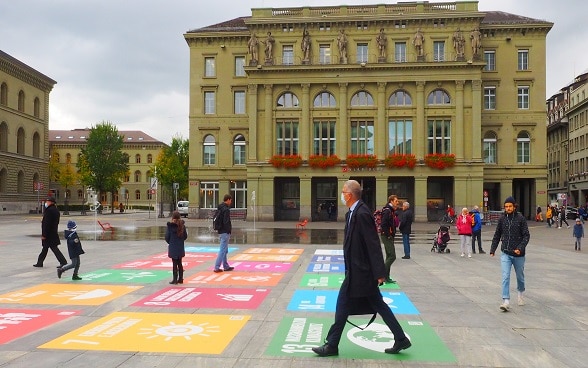"The pandemic highlights just how important reliable data is to overcoming a crisis."
In many countries no statistics and consequently no data – such as on the situation of vulnerable populations – exist. This makes it difficult to measure the effectiveness and progress of sustainable development globally. This is why Switzerland and the UN are holding the World Data Forum. Jacques Ducrest, one of the Federal Council's delegates for the 2030 Agenda, believes globally applicable standards for data and statistics can also help to combat pandemics.

The logo of the virtual World Data Forum 2020. © United Nations World Data Forum
Mr Ducrest, why is Switzerland holding the UN's World Data Forum in Bern?
Switzerland supports the 2030 Agenda's Sustainable Development Goals. It is essential that high-quality, comparable data and official statistics exist in order to implement these goals. This forum is a globally unique platform for bringing various data producers together with all data users. The UN enabled this dialogue to take place when it held the World Data Forum for the first time in South Africa in January 2017.

We aim to ensure this dialogue continues. That's why we are supporting the organisation of the World Data Forum. Even during the negotiations on the 2030 Agenda, Switzerland called for the measurement of the goals set. We can only actually engage in dialogue with the economy, science and the general public if the progress of implementation can be measured. By hosting the forum, Switzerland is actively supporting the measurability and implementation of the 2030 Agenda for Sustainable Development.
Which topics will be discussed at the conference?
In principle, any topic related in any way to the 2030 Agenda and its fact-based implementation can be discussed. Historically, the conference has been divided into six topic areas, such as 'sufficient resources for data and statistical systems', 'innovations', 'understanding the world through data' or 'establishing trust in data and statistics.' From the over 500 programme proposals submitted, the programme committee selected around 90 which were to be discussed at the forum in Bern from 18 to 21 October 2020. Then the pandemic struck and the physical version of the forum was postponed to October 2021.
What does that mean for the virtual conference?
As well as holding the conference virtually this year, it was also decided that the programme would be scaled back. In light of current events, it will focus on health-related issues: for example, how data can help to combat the pandemic. It is also important to underline that the challenges which have existed for years have not suddenly disappeared. That's why there will also be discussions on topics such as digitalisation, the financing of data and data in relation to the gender issue.
How exactly will the virtual conference work?
Under normal circumstances, we would welcome around 1,500 conference participants from over 100 countries to Bern. It would be a conference that would appeal to all stakeholders: people from the administration, civil society, the media and the economy etc. In short, anyone dealing with data and the 2030 Agenda. Despite – or perhaps precisely because of – COVID-19, we did not wish to simply put the UNWDF back a year and do nothing in the meantime. The pandemic has clearly shown just how important reliable and comparable data and statistics are to tackling a crisis efficiently.
The virtual forum has five plenary meetings in total and just over 30 other side events. These are organised by a wide range of actors: from NGOs (e.g. from Colombia), UN organisations (WHO, WMO, World Bank etc.), universities (e.g. Harvard, John Hopkins), statistical offices (e.g. UK and Poland) and the private sector (e.g. Facebook). Switzerland is organising three side events and will actively participate in the conference's opening and closing ceremonies. Federal Councillor Alain Berset will give an opening address. Anyone can register and take part. Over 5'000 people had registered by last Thursday. I think that's wonderful – it shows how important this dialogue with various actors is.
Why is it so important to Switzerland that the same standards apply worldwide in development cooperation?
The 2030 Agenda with its 17 Sustainable Development Goals and 247 indicators applies universally to all UN member states. This global standardisation of indicators – in other words data standards – enables Switzerland and its partners to tackle global issues, such as climate change and hunger, in a more effective and efficient way through coordinated measures.
Standardised data enables medium and long-term planning to be carried out, the effectiveness of various measures to be compared more simply and various actors from the public sector, civil society and the private sector to plan, demonstrate and coordinate their contribution towards implementing the Sustainable Development Goals more easily. This cuts costs, avoids redundancy and increases the impact of individual initiatives. As part of its International Cooperation Strategy, Switzerland is calling for better use of data and the inclusion of scientific research to improve the results-oriented management of its measures.
The World Data Forum is scheduled to take place in Bern next autumn. The 'Road to Bern' will be continued until then. What does that mean?
When Switzerland launched its bid, its aim wasn't simply to organise a major event. We believed it was important to use the time in the build-up to the forum to engage in dialogue with the Swiss population. In January 2020, the Federal Statistical Office, in cooperation with the FDFA, launched the 'Road to Bern' in the House of Switzerland at the World Economic Forum. The 'Road to Bern' has two main objectives: Firstly, the topics of the World Data Forum should be discussed in advance so that specific decisions, programmes and agreements can be presented at the forum itself. Secondly, dialogue should be promoted in Switzerland.

The population is entitled to a better understanding of why Switzerland is supporting the 2030 Agenda, its measurability and investment in statistical systems. We wish to engage in dialogue on this matter. That is why we have partnered up with the 'Rendez-vous Bundesplatz' light show which will address the issue of sustainability from 16 October to 21 November with 'Planet Hope'.
Together with various partners, we are organising 13 events as part of the 'Road to Bern'. I am pleased to invite you all to attend one or more of these events and take part in discussions with various experts.
You are the Federal Council's delegate for the implementation of the 2030 Agenda. What role do statistics and the issues addressed by the World Data Forum play in relation to the Agenda?
In his report on the Sustainable Development Goals, the UN Secretary-General Antonio Guterres declared in 2018: "without evidence of where we stand now we cannot confidently chart our path forward in realising the Sustainable Development Goals." Statistical or scientific data are essential to ensuring states can always keep track of their progress in implementing the 2030 Agenda. The data can also enable them to make the right decisions required for the continuation of the implementation process. These decisions are based on facts and also contribute to the democratic implementation of the Sustainable Development Goals.
The UN member states regularly report on the progress of implementation of the 2030 Agenda at the High-Level Political Forum on Sustainable Development. These reports must be based on generally accessible, current and reliable data and statistics to ensure they are drawn up with the appropriate level of objectivity. This also ensures the best possible comparability of the reports.
The UN is critical of the global data situation
- In 75% of countries in the world there is neither a statistics policy nor a sufficient data base.
- Only just over half of all states are able to provide basic data, such as on births and deaths.
- As far as more specific data is concerned, the situation is even more alarming. This means vulnerable population groups are barely included in average figures.
- There is no data for around two-thirds of the 232 indicators for the 2030 Agenda's goals and no data collection method has been agreed for 88 indicators.

